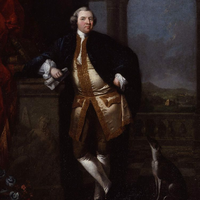Elegy XXVI. Describing the Sorrow of an Ingeneous Mind
Why mourns my friend? why weeps his downcast eye,
That eye where mirth, where fancy, used to shine?
Thy cheerful meads reprove that swelling sigh;
Spring ne’er enamell’d fairer meads than thine.
Art thou not lodged in Fortune’s warm embrace?
Wert thou not form’d by Nature’s partial care?
Bless’d in thy song, and bless’d in every grace
That wins the friend, or that enchants the fair?
‘Damon,’ said he, 'thy partial praise restrain;
Not Damon’s friendship can my peace restore:
Alas! his very praise awakes my pain,
And my poor wounded bosom bleeds the more.
‘For, O that Nature on my birth had frown’d,
Or Fortune fix’d me to some lowly cell!
Then had my bosom ‘scaped this fatal wound,
Nor had I bid these vernal sweets farewell.
’But, led by Fortune’s hand, her darling child,
My youth her vain licentious bliss admired;
In Fortune’s train the syren Flattery smiled,
And rashly hallow’d all her queen inspired.
‘Of folly studious, even of vices vain,
Ah, vices gilded by the rich and gay!
I chased the guileless daughters of the plain,
Nor dropp’d the chase till Jessy was my prey.
‘Poor artless maid! to stain thy spotless name,
Expense, and Art, and Toil united strove;
To lure a breast that felt the purest flame,
Sustain’d by Virtue, but betray’d by Love.
‘School’d in the science of Love’s mazy wiles,
I clothed each feature with affected scorn;
I spoke of jealous doubts, and fickle smiles,
And, feigning, left her anxious and forlorn.
‘Then while the fancied rage alarm’d her care,
Warm to deny, and zealous to disprove,
I bade my words the wonted softness wear,
And seized the minute of returning love.
‘To thee, my Damon, dare I paint the rest?
Will yet thy love a candid ear incline?
Assured that virtue, by misfortune press’d,
Feels not the sharpness of a pang like mine.
‘Nine envious moons matured her growing shame,
Erewhile to flaunt it in the face of day,
When scorn’d of Virtue, stigmatized by Fame,
Low at my feet desponding Jessy lay.
‘Henry,’ she said, 'by thy dear form subdued,
See the sad relics of a nymph undone!
I find, I find this rising sob renew’d;
I sigh in shades, and sicken at the sun.
‘Amid the dreary gloom of night, I cry,
When will the morn’s once pleasing scenes return?
Yet what can morn’s returning ray supply,
But foes that triumph, or but friends that mourn?
‘Alas! no more that joyous morn appears
That led the tranquil hours of spotless fame,
For I have steep’d a father’s couch in tears,
And tinged a mother’s glowing cheek with shame.
‘The vocal birds that raise their matin strain,
The sportive lambs, increase my pensive moan;
All seem to chase me from the cheerful plain,
And talk of truth and innocence alone.
’If through the garden’s flowery tribes I stray,
Where bloom the jasmines that could once allure,
‘Hope not to find delight in us,’ they say,
‘For we are spotless, Jessy; we are pure.’
‘Ye flowers! that well reproach a nymph so frail,
Say, could you with my virgin fame compare?
The brightest bud that scents the vernal gale
Was not so fragrant; and was not so fair.
’Now the grave old alarm the gentler young,
And all my fame’s abhorr’d contagion flee;
Trembles each lip, and falters every tongue,
That bids the morn propitious smile on me.
‘Thus for your sake I shun each human eye,
I bid the sweets of blooming youth adieu:
To die I languish, but I dread to die,
Lest my sad fate should nourish pangs for you.
’Raise me from earth; the pains of want remove,
And let me, silent, seek some friendly shore;
There only, banish’d from the form I love,
My weeping virtue shall relapse no more.
‘Be but my friend; I ask no dearer name;
Be such the meed of some more artful fair;
Nor could it heal my peace, or chase my shame,
That Pity gave what Love refused to share.
’Force not my tongue to ask its scanty bread,
Nor hurl thy Jessy to the vulgar crew;
Not such the parent’s board at which I fed!
Not such the precepts from his lips I drew!
‘Haply, when age has silver’d o’er my hair,
Malice may learn to scorn so mean a spoil;
Envy may slight a face no longer fair,
And Pity welcome to my native soil.’
‘She spoke-nor was I born of savage race,
Nor could these hands a niggard boon assign;
Grateful she clasp’d me in a last embrace,
And vow’d to waste her life in prayers for mine.
‘I saw her foot the lofty bark ascend,
I saw her breast with every passion heave;
I left her-torn from every earthly friend;
Oh, my hard bosom! which could bear to leave!
’Brief let me be: the fatal storm arose;
The billows raged, the pilot’s art was vain;
O’er the tall mast the circling surges close;
My Jessy-floats upon the watery plain!
‘And-see my youth’s impetuous fires decay:
Seek not to stop Reflection’s bitter tear;
But warn the frolic, and instruct the gay,
From Jessy floating on her watery bier.’

